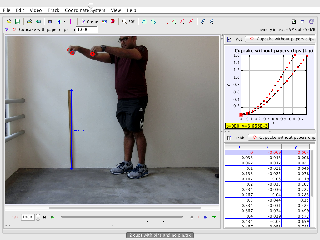

About
Free Fall Terminal Velocity
For Teachers
- Applications25.jpg
- Applications24.jpg
- Applications23.jpg
- Applications22.jpg
- Applications21.jpg
- Applications20.jpg
- Applications19.jpg
- Applications18.jpg
- Applications17.jpg
- Applications16.jpg
- Applications15.jpg
- Applications14.jpg
- Applications13.jpg
- Applications12.jpg
- Applications11.jpg
- Applications10.jpg
- Applications09.jpg
- Applications08.jpg
- Applications07.jpg
- Applications06.jpg
- Applications05.jpg
- Applications04.jpg
- Applications03.jpg
- Applications02.jpg
- Applications01.jpg
- Applications00.jpg
Credits
Document Brief: Title: "Tracker Cup Cakes with and without Paper Clips: An Application Study"
This document analyzes the dynamics of paper cups in free fall with and without the addition of paper clips. It explores the effects of added mass on descent behavior, terminal velocity, and air resistance, linking findings to practical applications.
Study Guide:
Objective: Examine how the addition of paper clips to paper cups affects their falling behavior and analyze the implications for physical principles like terminal velocity and air resistance.
Key Concepts:
-
Mass and Gravity:
-
Adding mass (via paper clips) increases the gravitational pull on the object, potentially altering its falling speed.
-
-
Air Resistance:
-
The force opposing the motion of the cups varies based on their shape, mass, and surface area.
-
-
Terminal Velocity:
-
Objects with added mass reach a higher terminal velocity as they overcome air resistance more effectively.
-
Experiment Overview:
-
Setup: Two identical paper cups, one with paper clips added for extra weight and one without.
-
Procedure: Drop both cups from the same height and observe their motion.
-
Observation Points:
-
Measure time taken to reach the ground.
-
Note differences in stability, speed, and alignment.
-
Questions to Consider:
-
How does added mass affect the falling speed of the cups?
-
Which cup reaches terminal velocity faster?
-
How does air resistance influence the motion of the lighter versus the heavier cup?
Applications:
-
Understanding the interplay of mass and air resistance in free-fall scenarios.
-
Designing objects for controlled descent, such as parachutes and weighted delivery systems.
FAQ:
-
Why add paper clips to the paper cups? Adding paper clips provides a simple way to increase the mass and examine its impact on falling dynamics, including speed and stability.
-
What is the expected difference between the cups? The cup with clips is expected to fall faster due to its greater ability to overcome air resistance.
-
How does terminal velocity relate to this experiment? Terminal velocity is the maximum speed reached during free fall. The heavier cup (with clips) likely achieves a higher terminal velocity.
-
Would results differ in a vacuum? In a vacuum, air resistance is absent, and both cups would fall at the same rate, irrespective of their mass.
-
What real-world scenarios relate to this study? This experiment models principles used in designing weighted objects for stability and efficiency in free-fall applications, such as drones, payloads, and safety equipment.
- Details
- Written by leongster
- Parent Category: 03 Motion & Forces
- Category: 02 Dynamics
- Hits: 4713
